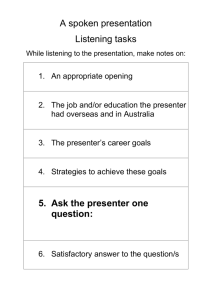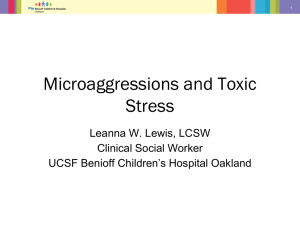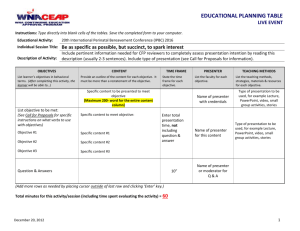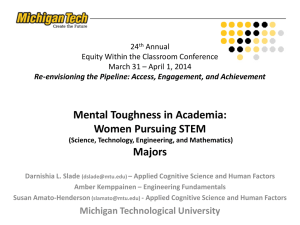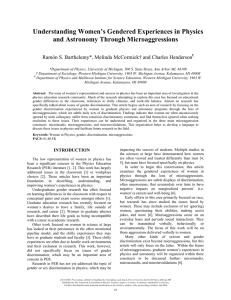Block 1 Sessions - 1:15pm Presenter: Dr. Damon A. Williams
advertisement
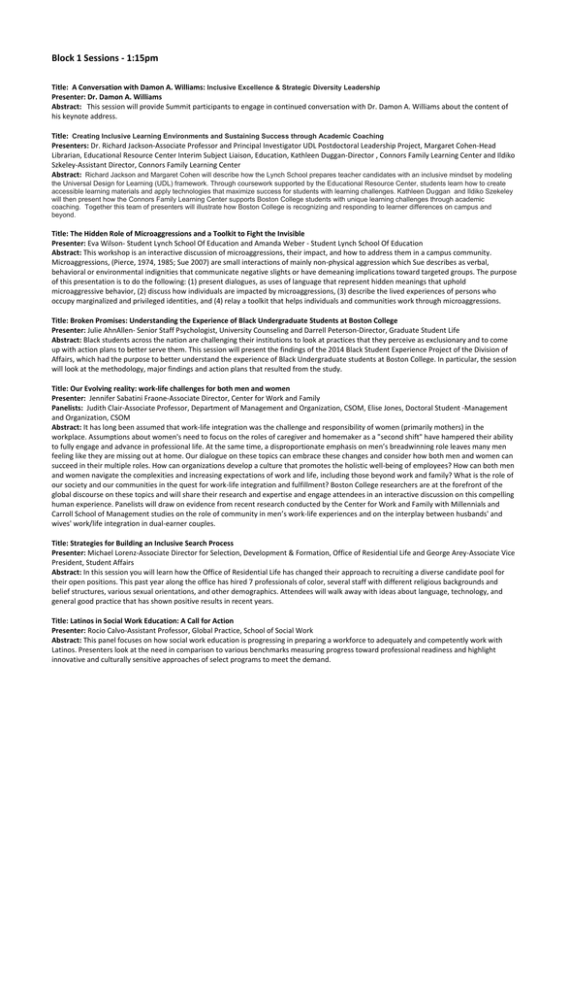
Block 1 Sessions - 1:15pm Title: A Conversation with Damon A. Williams: Inclusive Excellence & Strategic Diversity Leadership Presenter: Dr. Damon A. Williams Abstract: This session will provide Summit participants to engage in continued conversation with Dr. Damon A. Williams about the content of his keynote address. Title: Creating Inclusive Learning Environments and Sustaining Success through Academic Coaching Presenters: Dr. Richard Jackson-Associate Professor and Principal Investigator UDL Postdoctoral Leadership Project, Margaret Cohen-Head Librarian, Educational Resource Center Interim Subject Liaison, Education, Kathleen Duggan-Director , Connors Family Learning Center and Ildiko Szkeley-Assistant Director, Connors Family Learning Center Abstract: Richard Jackson and Margaret Cohen will describe how the Lynch School prepares teacher candidates with an inclusive mindset by modeling the Universal Design for Learning (UDL) framework. Through coursework supported by the Educational Resource Center, students learn how to create accessible learning materials and apply technologies that maximize success for students with learning challenges. Kathleen Duggan and Ildiko Szekeley will then present how the Connors Family Learning Center supports Boston College students with unique learning challenges through academic coaching. Together this team of presenters will illustrate how Boston College is recognizing and responding to learner differences on campus and beyond. Title: The Hidden Role of Microaggressions and a Toolkit to Fight the Invisible Presenter: Eva Wilson- Student Lynch School Of Education and Amanda Weber - Student Lynch School Of Education Abstract: This workshop is an interactive discussion of microaggressions, their impact, and how to address them in a campus community. Microaggressions, (Pierce, 1974, 1985; Sue 2007) are small interactions of mainly non-physical aggression which Sue describes as verbal, behavioral or environmental indignities that communicate negative slights or have demeaning implications toward targeted groups. The purpose of this presentation is to do the following: (1) present dialogues, as uses of language that represent hidden meanings that uphold microaggressive behavior, (2) discuss how individuals are impacted by microaggressions, (3) describe the lived experiences of persons who occupy marginalized and privileged identities, and (4) relay a toolkit that helps individuals and communities work through microaggressions. Title: Broken Promises: Understanding the Experience of Black Undergraduate Students at Boston College Presenter: Julie AhnAllen- Senior Staff Psychologist, University Counseling and Darrell Peterson-Director, Graduate Student Life Abstract: Black students across the nation are challenging their institutions to look at practices that they perceive as exclusionary and to come up with action plans to better serve them. This session will present the findings of the 2014 Black Student Experience Project of the Division of Affairs, which had the purpose to better understand the experience of Black Undergraduate students at Boston College. In particular, the session will look at the methodology, major findings and action plans that resulted from the study. Title: Our Evolving reality: work-life challenges for both men and women Presenter: Jennifer Sabatini Fraone-Associate Director, Center for Work and Family Panelists: Judith Clair-Associate Professor, Department of Management and Organization, CSOM, Elise Jones, Doctoral Student -Management and Organization, CSOM Abstract: It has long been assumed that work-life integration was the challenge and responsibility of women (primarily mothers) in the workplace. Assumptions about women's need to focus on the roles of caregiver and homemaker as a "second shift" have hampered their ability to fully engage and advance in professional life. At the same time, a disproportionate emphasis on men’s breadwinning role leaves many men feeling like they are missing out at home. Our dialogue on these topics can embrace these changes and consider how both men and women can succeed in their multiple roles. How can organizations develop a culture that promotes the holistic well-being of employees? How can both men and women navigate the complexities and increasing expectations of work and life, including those beyond work and family? What is the role of our society and our communities in the quest for work-life integration and fulfillment? Boston College researchers are at the forefront of the global discourse on these topics and will share their research and expertise and engage attendees in an interactive discussion on this compelling human experience. Panelists will draw on evidence from recent research conducted by the Center for Work and Family with Millennials and Carroll School of Management studies on the role of community in men’s work-life experiences and on the interplay between husbands' and wives' work/life integration in dual-earner couples. Title: Strategies for Building an Inclusive Search Process Presenter: Michael Lorenz-Associate Director for Selection, Development & Formation, Office of Residential Life and George Arey-Associate Vice President, Student Affairs Abstract: In this session you will learn how the Office of Residential Life has changed their approach to recruiting a diverse candidate pool for their open positions. This past year along the office has hired 7 professionals of color, several staff with different religious backgrounds and belief structures, various sexual orientations, and other demographics. Attendees will walk away with ideas about language, technology, and general good practice that has shown positive results in recent years. Title: Latinos in Social Work Education: A Call for Action Presenter: Rocio Calvo-Assistant Professor, Global Practice, School of Social Work Abstract: This panel focuses on how social work education is progressing in preparing a workforce to adequately and competently work with Latinos. Presenters look at the need in comparison to various benchmarks measuring progress toward professional readiness and highlight innovative and culturally sensitive approaches of select programs to meet the demand.

